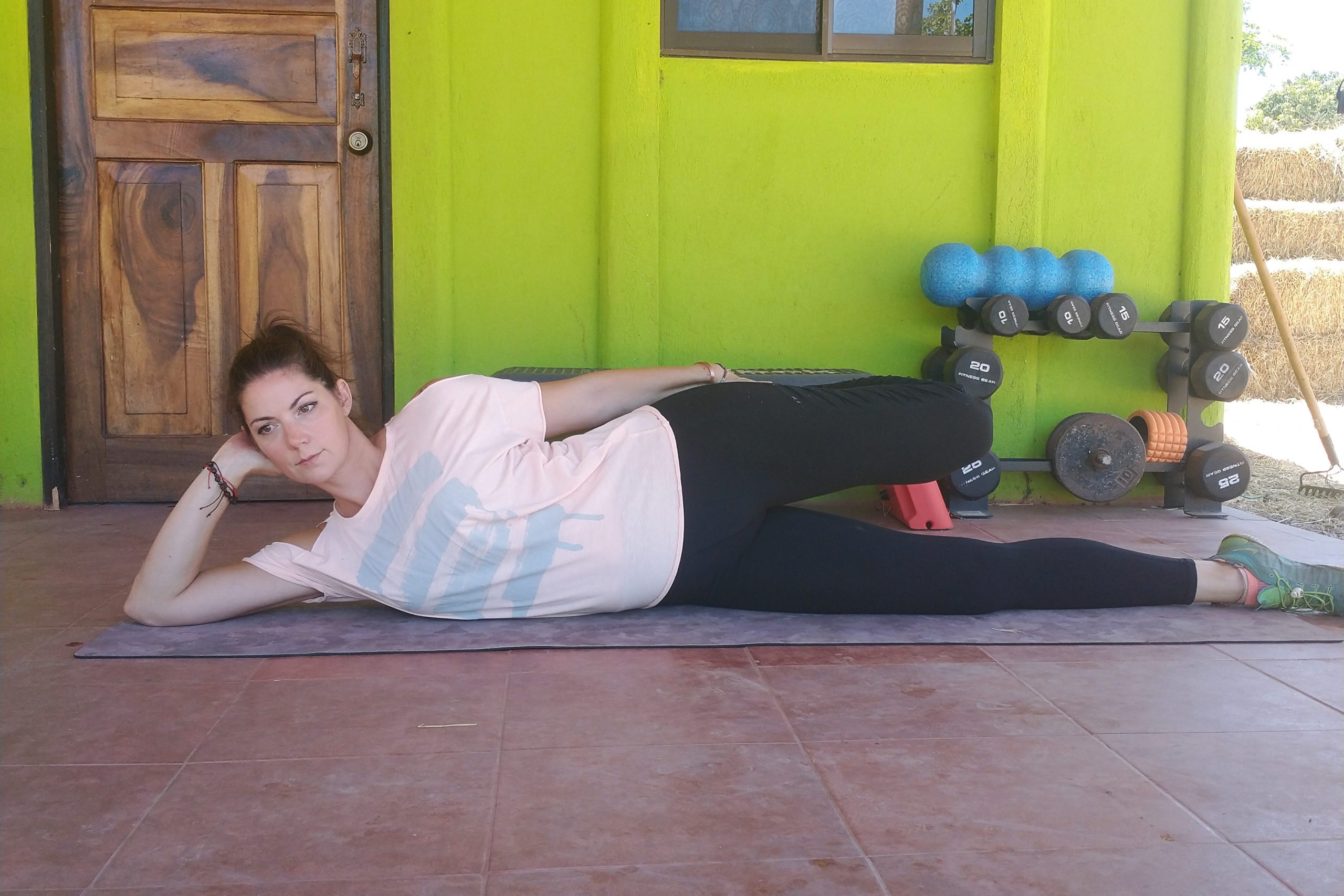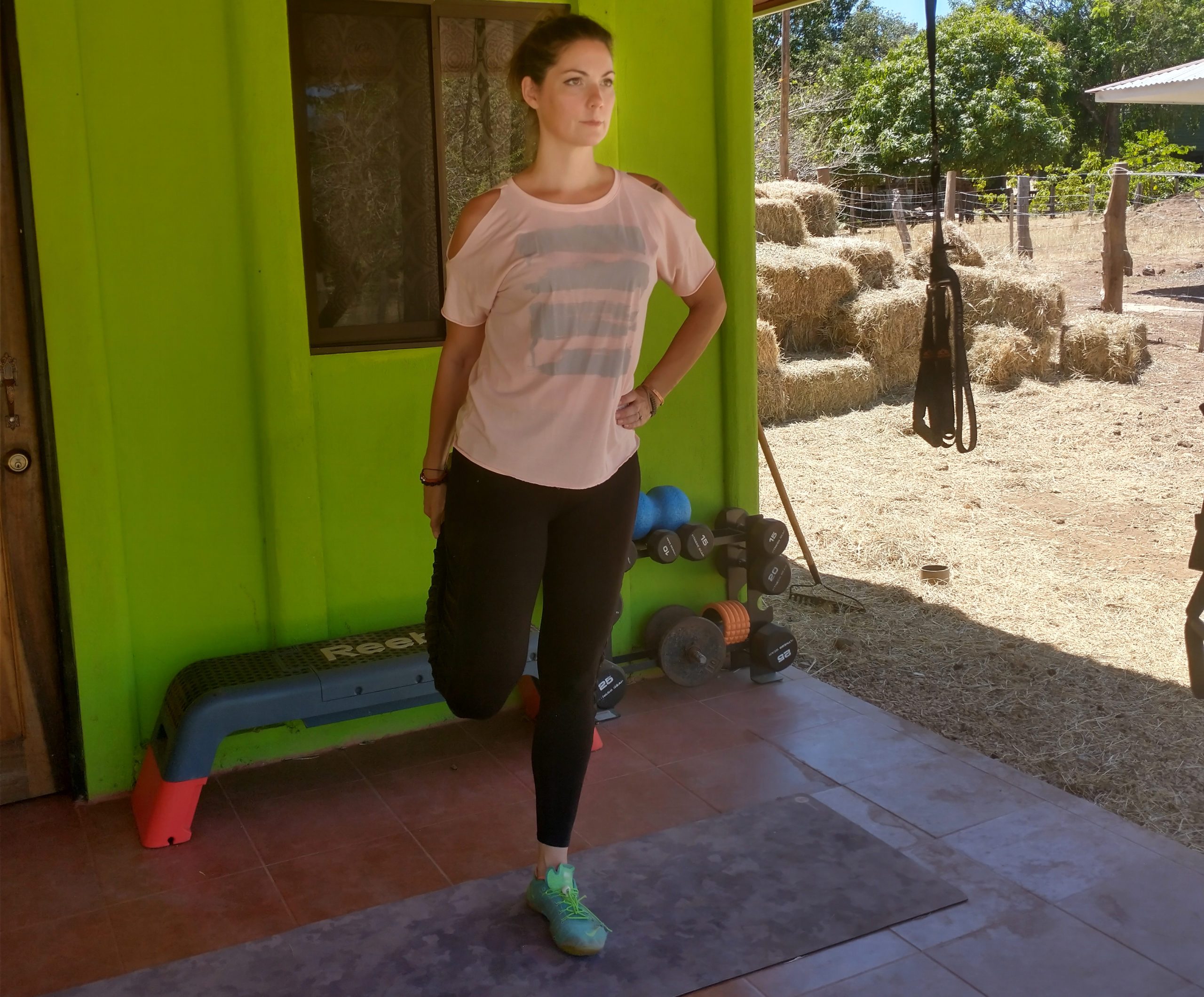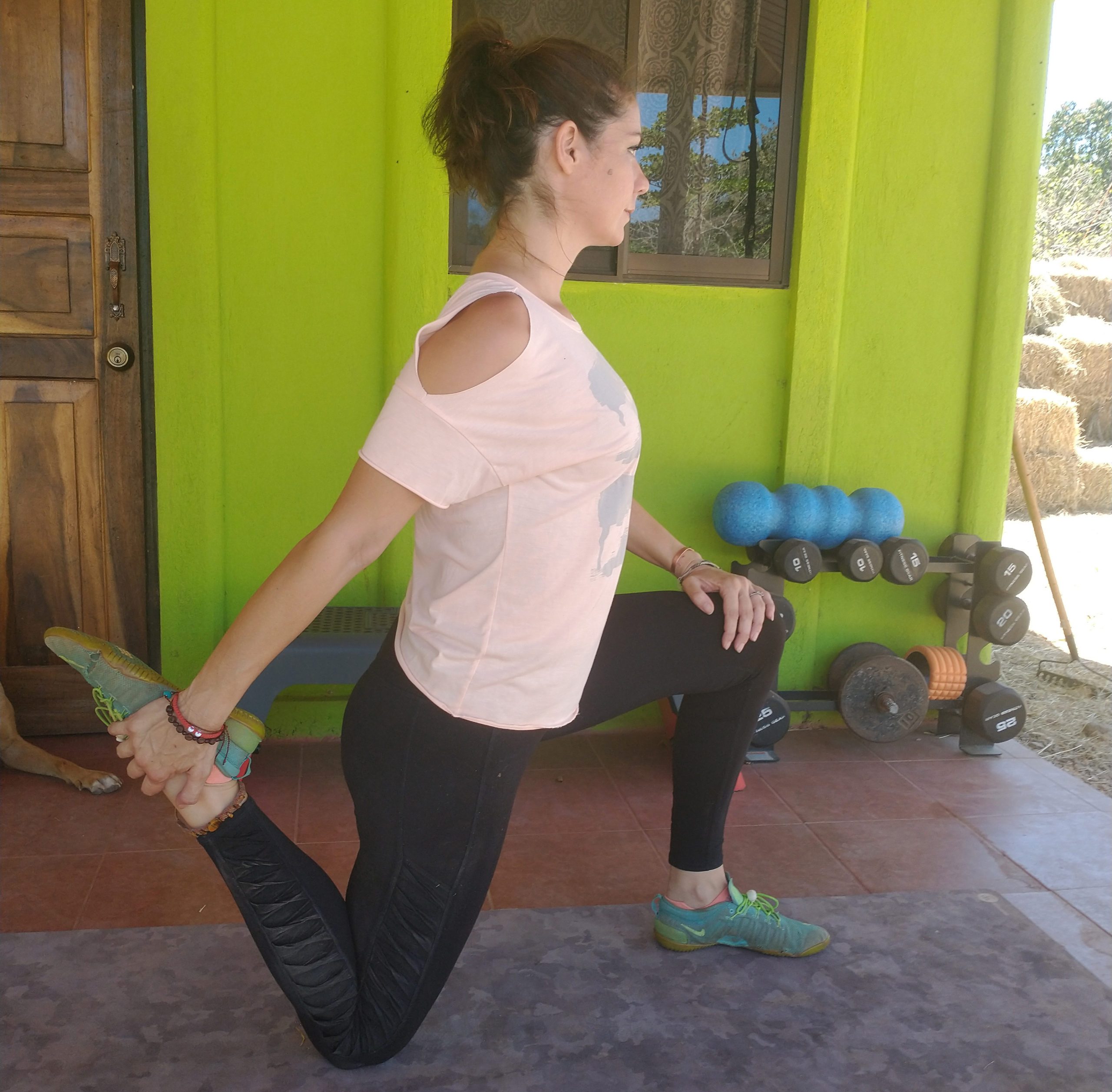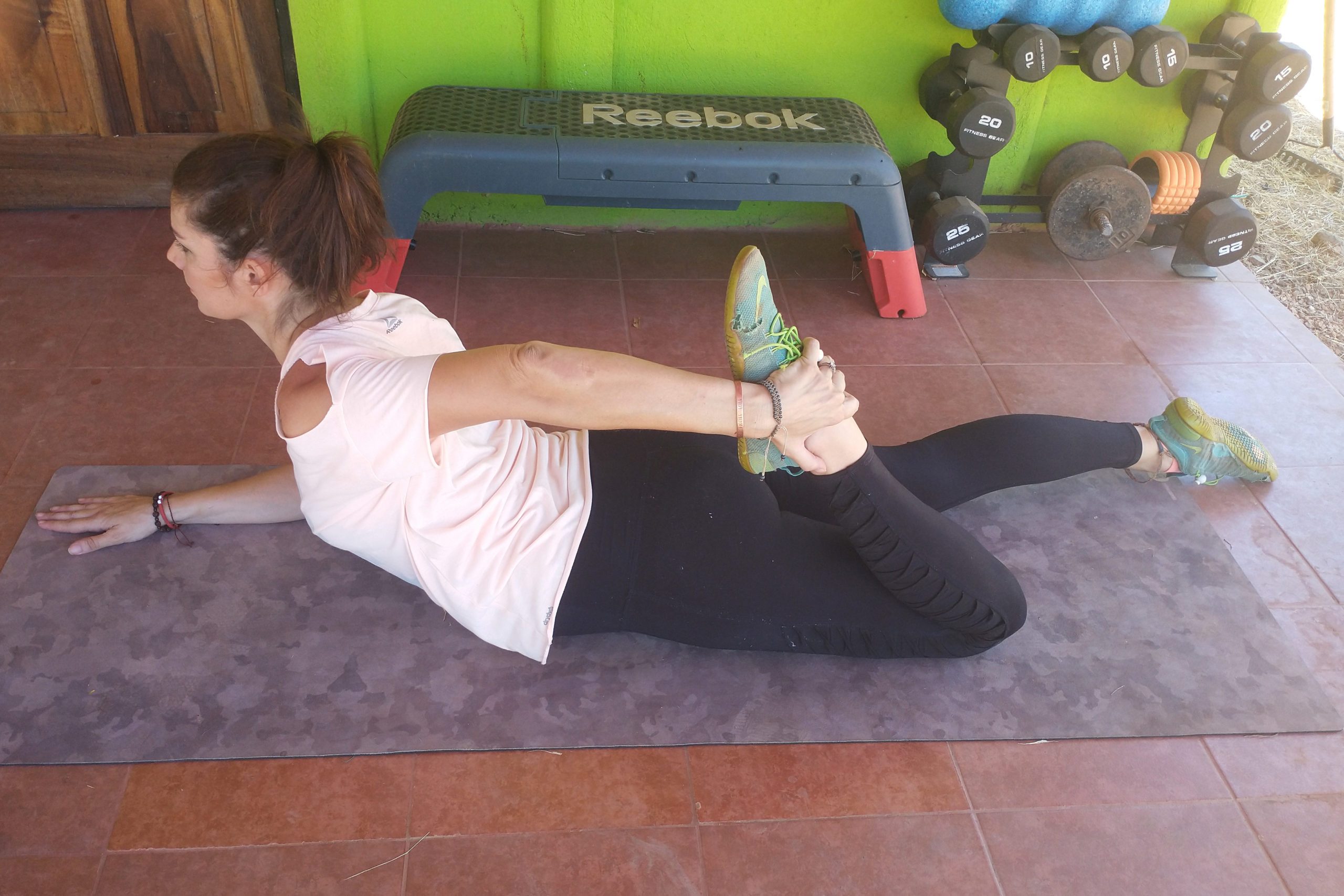Your quads, or quadriceps femoris muscle group, are four separate muscles that run along the front of your thigh between your hip and your knee. It’s one of the largest (and strongest) muscle groups in the body.
These muscles are targeted during popular leg exercises like squats and lunges, and they’re some of the “show me” muscles that people love developing as a way to demonstrate their gym prowess.
(Related: 4 Expert Tips You Need to Know to Stretch Properly)
Why tight quads are so common
One of the problems with these “show me” muscle groups that typically span the front half of the body is that they’re often overworked. The other “show me” muscles include the abs, pecs, and biceps.
Quads’ counterpartsthe hamstrings, the muscles that run along the back of the thighare underworked, ultimately leading to imbalances and the potential for pain or injury.
“People often go into the gym with an unstructured training program and wind up with an extremely unbalanced physique,” says CJ McFarland, head strength coach for Onnit Gym in Austin, Texas.”An important goal is to make sure you’re training all parts equallythis means if you’re going to do a lot of quad-dominant movements, like squats, you need to do the same amount of work-volume load to the posterior chain (hamstrings) through moves like the Romanian deadlift,” he says.
And when you work one part of your body incessantly, to the detriment of opposing muscle groups, you often end up with tightness that can hinder range of motion or mobility. If you feel like your quads are unusually tight, you may end up with knee pain.As McFarland explains, “This is due to the stress placed on the patella tendon by an excess amount of quad-dominant movements. If you feel sharp knee pain when bending your knees, you should stop immediately and try to find an alternative that won’t elicit the same response.”
For instance, many people who feel pain during a squat or lunge, may not feel the same pain when doing a plyo-box step-up. While the movements all target the same general muscle groups, with a strong focus on the quads and glutes, step-ups tend to be easier on the knees.
Quad stretches to loosen up
If you’ve been feeling knee pain during squats and lunges, or if you feel like your range of motion during these exercises is more restricted, it’s definitely time to add a few quad stretches to your routine.Remember, you shouldn’t focus on only stretching your quads, either.
“Everyone should focus on developing or following a well-thought-out mobility program that can help decrease tightness throughout the body,” McFarland says.
As such, consider including a few of the following stretches to your cool-down routine in conjunction with a total-body flexibility program.
(Related: Why You Should Make Post-Workout Stretching a Priority)

Side-lying quad stretch
Lie on your right side on a mat, your legs extended, your left leg stacked on top of your right leg.
Use your right hand to “prop up” your head, your upper arm, and elbow pointing toward the top of the mat.
Bend your left knee, drawing your left heel toward your butt. Reach back with your left hand to grasp the top of your left foot or ankle.
Gently use your arm to draw your heel closer to your butt. When you feel a stretch through the front of your left thigh, hold the stretch for 20 to 30 seconds. Release for a breath, and repeat two to three more times before switching sides.
(Also, try the lunge quad stretch.)

Standing quad stretch
This is the stretch you probably remember from elementary school gym class. Stand tall, your feet roughly hip-distance apart, your knees slightly bent (not locked).
Shift your weight to your left foot, and carefully lift your right foot from the ground, bending your right knee as you draw your right heel toward your right butt cheek.
To help with balance, stand next to a wall or sturdy chair and place your left hand lightly on the object to help you stay upright and steady.
Reach back with your right hand and grab the top of your right foot or ankle. Use your hand to gently draw your right heel closer to your butt. Avoid tipping forward at the hipsyou want to maintain good posture throughout the exercise.
When you feel a stretch through the front of your right thigh, hold the position for 20 to 30 seconds. Release for a breath, then repeat the exercise two to three more times before switching sides.

Kneeling quad stretch
Kneel on your mat as though you were about to make a wedding proposal.
In this position, your left foot flat on the floor in front of you, your knee and hip bent at 90-degrees, your right hip extended with your right knee on the mat, aligned directly under your hip, the top of your right foot and shin on the mat behind you.
Keeping your torso tall and your posture strong, bend your right knee and lift your right foot toward your butt.
Reach your right hand behind you to grasp the top of your right foot or ankle. Without tipping your torso forward or leaning back, use your right hand to draw your ankle closer to your glute. When you feel a good stretch through the front of your right thigh, hold the position for 20 to 30 seconds.
Release the stretch for a breath, then repeat two to three more times before switching sides.
(Here’s another kneeling quad stretch to try.)

Prone quad stretch
Lie on your stomach on a mat, your legs extended, your feet roughly hip-distance apart. Prop yourself up on your elbows and forearms, your elbows aligned with your shoulders, your shoulders squared to the front of the mat.
Your upper body should help with support, but other than the actively involved arm, it shouldn’t move or “assist” with the stretch.
Bend your left knee and draw your left foot toward your left glute. Reach back with your left hand to grasp the top of your left foot or ankle. Use your left hand to gently draw your left ankle closer to your left glute.
Try to keep your knee pointing straight down toward the end of the matyou don’t want it to splay outward. When you feel a good stretch through the front of your left thigh, hold the position for 20 to 30 seconds.
Release the stretch for a breath, then repeat two to three more times before switching sides.
Now that you know about the best quad stretches, check out the best stretches for upper back pain.
The post 4 Quad Stretches Everyone Should Know appeared first on Best Health Magazine Canada.


0 Commentaires